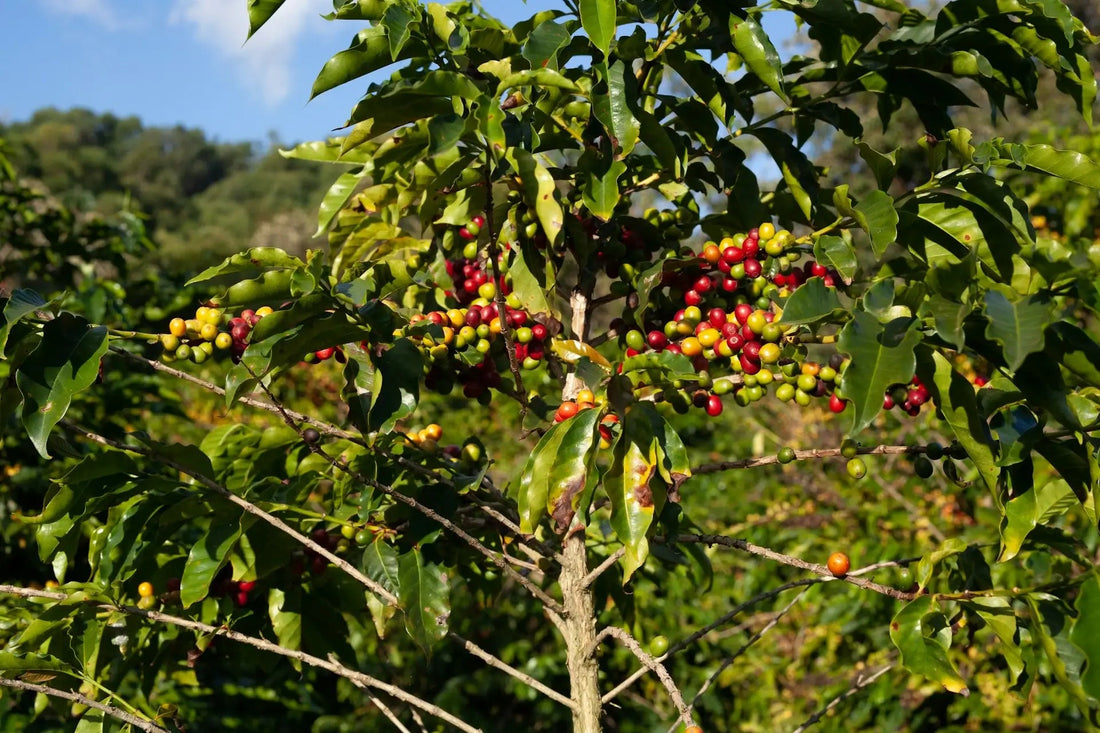Arabica vs Robusta: Key Coffee Bean Differences
☕ Estimated read time: 4 minutes
If you're a coffee lover, you've probably seen the terms Arabica coffee and Robusta coffee used frequently, but what do they actually mean?
Both types of coffee beans—Arabica and Robusta—offer unique flavour notes that suit different palates. This guide breaks down the differences between Arabica beans and Robusta beans to help you choose the best coffee for your taste and lifestyle.

A healthy coffee plant growing in the shade, with unripe green cherries — the origin of both Arabica and Robusta beans.
What is Arabica Coffee? 🫘
Arabica coffee comes from the Coffea arabica plant and makes up around 60–70% of the world’s coffee production. It’s widely regarded as the superior bean due to its complex flavour profile and aromatic qualities. According to the International Coffee Organisation (ICO), Arabica beans dominate global speciality markets due to their flavour diversity and delicate growing conditions.

A smooth, freshly brewed cup of Arabica coffee — known for its sweet, fruity flavour.
Key Characteristics of Arabica Beans:
- Flavour: Sweet, fruity, and floral notes with high acidity.
- Caffeine: Lower caffeine content compared to Robusta.
- Growing Conditions: Prefers high altitudes and cooler climates.
- Market Use: Popular in speciality coffee and premium blends.
What is Robusta Coffee? ☕️
Robusta coffee is made from the Coffea canephora plant and accounts for around 30–40% of global coffee production. It’s known for its bold, bitter taste and high caffeine content.

Close-up of Robusta coffee beans, darker and more textured with bold, earthy notes.
Key Characteristics of Robusta Beans:
- Flavour: Earthy, nutty, and bitter with low acidity.
- Caffeine: Roughly twice the amount found in Arabica.
- Growing Conditions: Thrives at lower altitudes and in warmer climates.
- Market Use: Commonly found in espresso blends and instant coffee.

Visual breakdown of the key differences between Arabica and Robusta coffee beans.
Arabica vs Robusta: A Side-by-Side Comparison
| Feature | Arabica Coffee | Robusta Coffee |
|---|---|---|
| Flavour | Sweet, fruity, floral, aromatic | Bitter, earthy, strong, nutty |
| Caffeine Content | Low | High |
| Acidity | High | Low |
| Growing Altitude | High altitudes (1,200m+) | Low altitudes (200–800m) |
| Plant Resilience | Less disease-resistant | Highly resistant to pests and disease |
| Market Use | Speciality and high-end coffees | Espresso blends, instant coffee |

Side-by-side comparison of Arabica and Robusta coffee beans — Arabica appears lighter and oval, while Robusta is smaller, rounder, and darker.
Which Should You Choose? 🤔
The choice between Arabica beans and Robusta beans depends on your preferences.
- Choose Arabica coffee if you enjoy a sweet, smooth, and layered cup with floral or fruity notes.
- Opt for Robusta coffee if you prefer a stronger, bolder brew with a big caffeine hit.
☕ Keep Learning

Professional coffee cupping setup used to evaluate Arabica and Robusta flavour profiles.
Shop Freshly Roasted Coffee at Wrexham Bean
Ready to taste the difference? Shop our hand-roasted Arabica beans, sourced from high-altitude farms and roasted in Wrexham. ☕️
🌿 Every coffee lover has a preference. Arabica, Robusta, or a bit of both? Share your story with us — because every brew has a journey.




